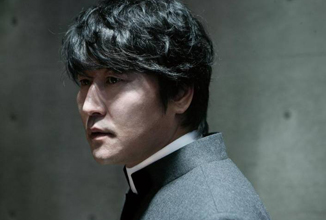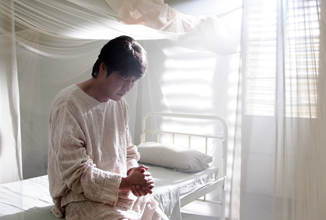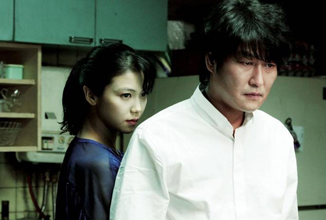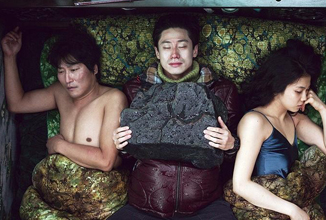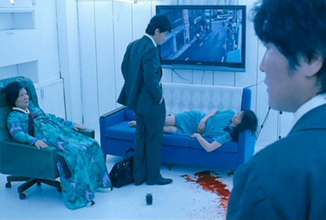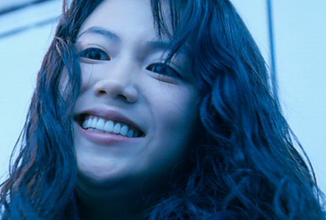"Like a leper rotting in flesh, let all avoid me… Leave me with no pride and have me live in shame… Let no one pray for me."
At the time of writing this review, the past eighteen months have seen the largest global recession for over seventy years. Financial institutions have been in crisis; companies, many of which were household names, have fallen with increasing regularity and experts are warning that a full recovery may yet take years. At times such as these we, as individuals, tend to focus our fears inward, becoming more concerned with regard to our long-term security, worrying that we may have been too excessive and wishing that we could just let loose without fear of consequences - financial or otherwise. Add to that, the world's increasing awareness, and fear, of terrorist threats and we are left feeling that something dark and dangerous may be hiding beneath the surface of society, attempting to destroy our normality and day-to-day lives.
The subjects which appeal to us in literature, cinema and television are also affected by all of the above, with tales of individuals (human or not) who are not constrained by mundane, everyday fears or rules, and stories of survival in worst case scenarios, rising in popularity in each economic downturn and in direct proportion to increased paranoia of possible cataclysmic events.
In short, vampires, zombies, creatures of the night and impending/post apocalypse stories are, once again, very much in vogue.
And so to Thirst, Park Chan-wook’s refreshingly unique take on the vampire genre.
Inspired by Émile Zola’s 1867 novel, Thérèse Raquin, Thirst tells the story of Father Sang-hyun (Song Kang-ho), a devout Catholic priest who has an overwhelming desire to truly help those in need, which he feels is unfulfilled by taking confessions, holding mass and performing last rites. Against the wishes of his superior, and the Vatican, he travels to a remote clinic where an experimental vaccine is being developed to fight an incredibly infectious and deadly virus (called EV), and agrees to become a test subject - being injected with the vaccine, and subsequently the virus, to test the vaccine’s effectiveness. Unfortunately, Sang-hyun contracts the full EV disease, begins vomiting blood and collapses, and doctors are only able to save his life by giving him a blood transfusion.
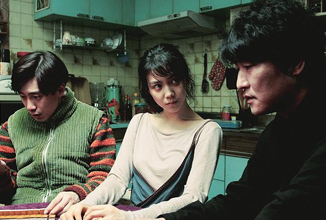 |
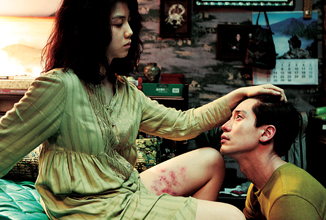 |
Subsequently, appearing to make a complete recovery, Sang-hyun is hailed by all around as a man touched by the hand of God, with many believing that he is a saint who possesses healing powers (leading to him being asked to visit and “heal” his childhood friend Kang-woo (Shin Ha-kyun), who is suffering from cancer) but, in fact, the blood used for the transfusion which saved Sang-hyun’s life was infected and has turned him into a vampire.
On visiting Kang-woo, Sang-hyun is reacquainted with the ill man’s wife, Tae-ju (Kim Ok-vin), - a woman whom he has secretly been attracted to since his youth and who clearly reciprocates those feelings - kick-starting a battle within him, between the “pure” priest and the lustful, blood-thirsty creature of the night…
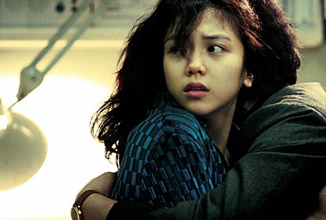 |
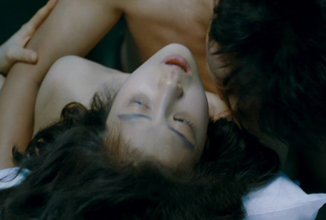 |
Those who are familiar with Park Chan-wook's previous films will recognise elements within Thirst (ultra-violence, fantasy and black humour, to name but three) which have become almost his trademark and they are exquisitely combined here to create a sumptuously rich, dark and twisted love story. However, even that description is over-simplistic as Thirst weaves an incredibly detailed tapestry which virtually defies categorisation or pigeon-holing.
Incredibly funny, but not a comedy; brutal, but not a hardgore thriller; surreal, but not a straight-out fantasy; Thirst is a film, the likes of which even fans of Park Chan-wook are unlikely to have seen before. As such, a single viewing really isn't sufficient to take in all the intricacies present, with subsequent viewings clearly showing a film which has still yet more to offer.
At its core, Thirst is a discussion of morality and of how our beliefs, or lack thereof, dictate what we consider to be acceptable or justifiable. What vampirism actually is, and what being a vampire means, differs for each of the main characters of Sang-hyun and Tae-ju (with belief and self-perception playing a major part for both) and this allows many more morally complex issues to be raised, compared and contrasted, than would be the case if the treatment of the subject matter had been standard vampire/demon/creature of the night fare:
From the earliest stages of the film it is apparent that Father Sang-hyun has doubts about his faith - being unsure of whether his prayers, confession-taking and last rites ceremonies actually serve the purpose for which they are intended - and the need to do something which gives him tactile proof of truly helping his fellow man directly leads him to take part in the vaccine experiments and, subsequently, to his becoming a vampire. From the moment that he realises what he has become, he treats his vampirism as a disease which, though it changes his needs and his abilities, doesn't change his underlying desires or who he is as a person. His doubts about faith remain, as does his belief in the sanctity of life, and he can only reconcile his need for blood by endeavoring to ensure that he doesn't randomly kill to obtain it.
His lustful feelings for Tae-ju also remain unchanged and, though being a vampire allows him to finally act on his desire for her, he continues to believe that he is committing a sin which is made much greater by the fact that he is still also a priest.
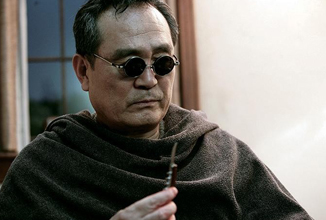 |
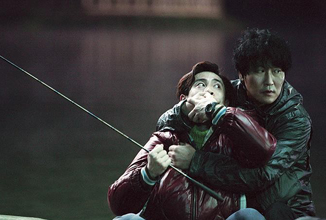 |
By contrast, Tae-ju has no faith whatsoever and firmly believes that "when you're dead, you're dead". Deeply unhappy with her day-to-day life (up until the point when Sang-hyun - after he becomes a vampire - comes back into her life), she feels that she has been living as little more than an unwilling slave to Kang-woo's family, and her deepening relationship with her vampire lover acts as a way for her to escape her perceived shackles and be the woman she really wants to be.
*SPOILER ALERT*
From her perspective, the idea that vampirism is a disease is plainly wrong, and becoming a vampire actually changes who she believes herself to be ("we're not human, we're human-eating beasts"). Finally able to do exactly as she pleases, she positively wallows in her new persona - even convincing herself that blood obtained by killing tastes better - but her unrestrained wantonness is, in fact, much less a result of the changes which becoming a vampire cause, and more that vampirism simply gives her a subconscious, ready-made excuse to allow her true self to come to the fore.
Sang-hyun and Tae-ju's contrasting beliefs, of course, massively collide and serve to lead viewers on an exhilarating ride to the conclusion of their sensuous, twisted love story.
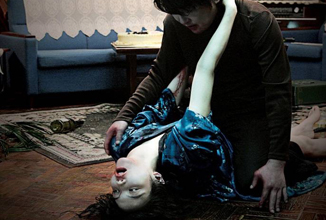 |
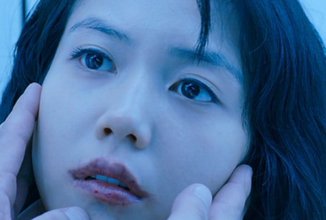 |
As one would expect from a Park Chan-wook film, production values are incredibly high. Direction is suitably accomplished and is beautifully complimented by a stunning classical soundtrack, giving a baroque feeling to proceedings. As the story centres on the two main vampire characters, a lot of the scenes are filmed at night, or in situations requiring artificial light, and Park Chan-wook succeeds in bringing a depth of colour and richness to each, and it almost goes without saying that he regularly manages to speak volumes with the subtlest, expertly crafted, elements within scenes.
Sensuality, and sexual longing, positively ooze from the screen in every scene between our lovers, and though there is quite a large amount of nudity present, Park Chan-wook always provides a justifiable reason for its presence and, in conjunction with the chemistry between the two leads, ensures that viewers truly believe the passion which the characters have for each other.
Cast:
In the last few years, Song Kang-ho has not put a foot wrong in his choice of roles and numerous performances, and his portrayal of Sang-hyun adds further proof that he really does deserve his position as one of the best male South Korean actors around today. His acting in Thirst is nuanced and understated while remaining easily strong enough for the other actors to play off.
When it was first announced that Kim Ok-vin (aka Kim Ok-bin) was to play the role of Tae-ju, some questioned whether someone so young would be able to give a portrayal of suitable gravitas to a character who begins her journey as a world-weary wife, progressing to become a wanton femme fatale, but her incredible performance proves that Park Chan-wook was utterly justified in casting her in the role. Contrary to those initial reactions, her youth brings an extra level to the characterisation of Tae-ju - for someone so youthful to be so completely, and believably, downtrodden (or so she appears) gives credence to the tales of woe she tells Sang-hyun and, as her brazen sexuality takes centre stage, her youth and incredible beauty bring a fire to the role that is, frankly, intoxicating.
Considering the history of reactions to film nudity in Korea, Kim Ok-vin took somewhat of a risk in agreeing to film scenes with the explicitness seen in Thirst, but that risk has clearly paid off and those scenes play a large part in raising the overall feeling of total, unbridled passion between Tae-ju and Sang-hyun.
Kim Ok-vin has received numerous awards for her acting in the past, but her performance in Thirst breathes such genuine sensuality, fun and tempestuousness that it really leaves her previous work in the shade.
The majority of the other characters in Thirst are very much supporting roles, but note should be made of Shin Ha-kyun's portrayal as Kang-woo: Fans of South Korean cinema will easily recognise him as an actor who is incredibly adept at playing odd, eccentric characters (most notably his portrayal of Byeong-gu in Save The Green Planet) and seeing him cast so perfectly as a sickly, slightly dim, mummy's boy makes it hard to imagine anyone else being able to play the role as wonderfully.
Summary:
Thirst truly is a sumptuous film and the sum of its many parts utterly redefines the concept of beauty and the beast.
Cast (Actor...
Character):
Song Kang-ho... Father Sang-hyun
Kim Ok-vin... Tae-ju
Shin Ha-kyun... Kang-woo
DVD
The DVD
edition reviewed here is the UK (Region 2) Palisades Tartan Release
which consists of a single disc DVD package. The film itself is
provided as an anamorphic transfer with an aspect ratio of 2.35:1. There are no image artifacts and no ghosting present, and the
picture remains consistently sharp and beautifully rich, with great depth of field throughout. The original Korean
language soundtrack is provided as a choice of Dolby Digital 5.1, DTS 5.1 and Dolby Digital 2.0 and each is clear and expansive, giving full justice to the gorgeous classical soundtrack. Excellent subtitles are provided
throughout the main feature and all of the extras.
DVD Extras:
Exclusive to the UK DVD release of Thirst is a 14 minute interview with director
Park Chan-wook. The interview is, obviously, in Korean with subtitles provided. As always, Park Chan-wook reveals interesting, and often lesser known, information throughout.
The
film's theatrical trailer rounds off the extras
package.
DVD
Details:
• Director: Park Chan-wook
• Format: PAL,
Anamorphic, Widescreen, Subtitled
• Language: Korean
•
Subtitles: English
•
Sound: Dolby Digital 5.1, Dolby Digital 2.0, DTS 5.1
• Region: Region 2
• Aspect Ratio:
2.35:1
• Number of discs: 1
• Classification: 18
• Studio:
Palisades Tartan
• Run Time: 128 minutes (approx.)
|


